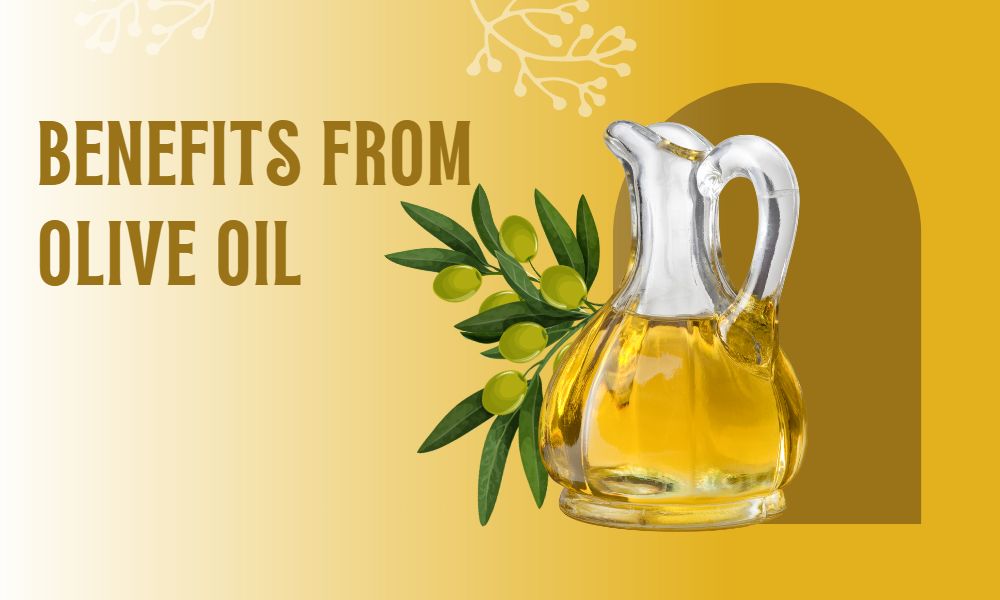Benefits from olive oil
Olive oil is a staple in Mediterranean cuisine, and its health benefits have been recognized for centuries. In recent years, studies have shown that incorporating olive oil into your diet can have a range of benefits, from reducing the risk of chronic diseases to improving brain function. In this blog post, we’ll explore the top 10 benefits of olive oil.
- Reduces the risk of heart disease Olive oil is rich in monounsaturated fats, which can lower cholesterol levels and reduce the risk of heart disease. Studies have shown that replacing other fats in your diet with olive oil can reduce your risk of heart disease by up to 30%.
- Improves brain function Olive oil is rich in antioxidants, which can help protect your brain cells from damage. Studies have shown that consuming olive oil regularly can improve cognitive function and reduce the risk of dementia and Alzheimer’s disease.
- Helps maintain a healthy weight Olive oil is a source of healthy fats that can help you feel full and satisfied after meals. Incorporating olive oil into your diet can help you maintain a healthy weight by reducing cravings and preventing overeating.
- Reduces inflammation Olive oil contains oleocanthal, a compound that has been shown to have anti-inflammatory properties. Consuming olive oil can help reduce inflammation throughout the body, which can lower the risk of chronic diseases such as cancer, arthritis, and diabetes.
- Supports healthy digestion Olive oil can help stimulate the production of digestive enzymes, which can aid in the digestion and absorption of nutrients. Consuming olive oil can also help prevent constipation and other digestive issues.
- Protects against cancer Studies have shown that the antioxidants in olive oil can help protect against certain types of cancer, including breast, colon, and prostate cancer. The anti-inflammatory properties of olive oil can also help prevent the development of cancer cells.
- Supports healthy skin Olive oil is rich in vitamin E, which can help protect your skin from damage caused by free radicals. Applying olive oil topically can also help moisturize and soothe dry, irritated skin.
- Improves bone health Olive oil is a source of vitamin K, which is essential for bone health. Consuming olive oil can help increase bone density and reduce the risk of fractures and osteoporosis.
- Reduces the risk of depression Studies have shown that consuming olive oil regularly can reduce the risk of depression and improve overall mood. The healthy fats in olive oil can help support brain health and reduce inflammation, which can contribute to a lower risk of depression.
- Promotes longevity The Mediterranean diet, which is rich in olive oil, has been associated with longer life expectancy and a reduced risk of chronic diseases. Consuming olive oil regularly can help support overall health and well-being, and may contribute to a longer, healthier life.
The benefits of olive oil are numerous and varied, ranging from reducing the risk of heart disease and cancer to improving brain function and supporting healthy skin. By incorporating olive oil into your diet and skincare routine, you can enjoy these benefits and support overall health and well-being.
When incorporating olive oil into your diet, it’s important to choose high-quality, extra-virgin olive oil. This type of olive oil is made from the first press of olives and is minimally processed, preserving healthy nutrients and antioxidants.
When cooking with olive oil, it’s best to use it in low-heat cooking methods such as sautéing and baking. High heat can cause the oil to break down and lose its health benefits. Olive oil can also be used as a finishing oil, drizzled over cooked vegetables, or used as a dip for bread.

In addition to its culinary uses, olive oil can also be used in skincare and beauty routines. Applying olive oil topically can help moisturize and soothe dry, irritated skin, and can be used as a natural alternative to traditional skincare products.
To use olive oil as a skincare treatment, simply apply a small amount to your skin and massage gently. You can also mix olive oil with other natural ingredients such as honey or avocado for added benefits.
Overall, incorporating olive oil into your diet and skincare routine can have numerous benefits for your health and well-being. By choosing high-quality, extra-virgin olive oil and using it in a variety of ways, you can enjoy the many benefits of this versatile and nutritious oil.
Here are a few more ways to incorporate olive oil into your daily routine:
- Use it as a salad dressing: Mix olive oil with a bit of vinegar or lemon juice to create a healthy, flavorful salad dressing.
- Add it to smoothies: A tablespoon of olive oil can add healthy fats to your smoothie and make it more filling.
- Use it for baking: Olive oil can be used in place of butter or vegetable oil in baking recipes, adding a healthy twist to your favorite treats.
- Dip bread in it: Instead of using butter or margarine, try dipping your bread in a bit of olive oil for a healthy and delicious snack.
- Use it for roasting vegetables: Drizzle olive oil over your favorite vegetables before roasting to add flavor and nutrients.
When selecting olive oil, it’s important to look for extra-virgin olive oil that has been cold-pressed and is free of additives. Avoid olive oils that have been processed using heat or chemicals, as these methods can destroy healthy nutrients and antioxidants.
In conclusion, olive oil is a versatile and nutritious oil that can have numerous benefits for your health and well-being. By incorporating it into your daily routine, you can enjoy the many benefits of this healthy oil and support overall health and wellness.